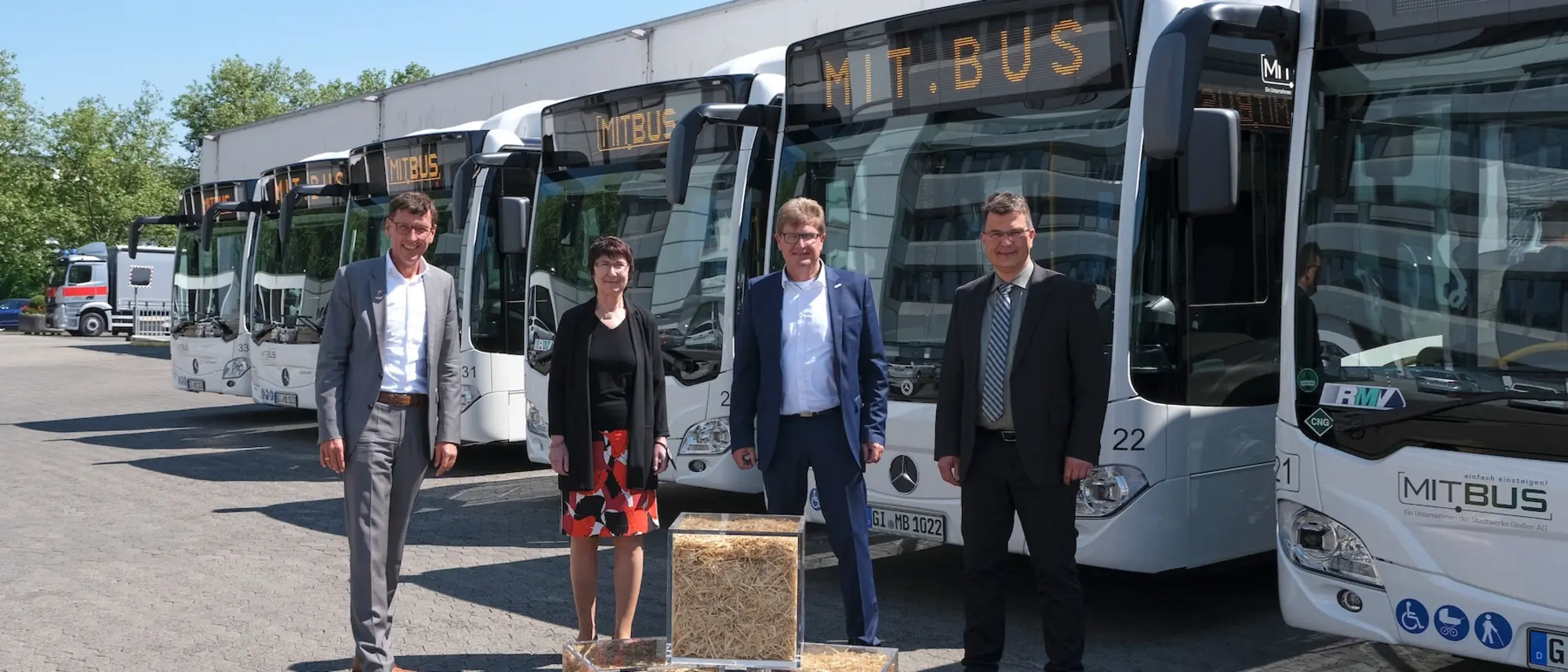In future, six new buses with efficient mild hybrid technology will be travelling the streets of Giessen. MIT.BUS is thus further reducing the emissions of its fleet.
Giessen. MIT.BUS, a subsidiary of Stadtwerke Gießen (SWG), is replacing six 13-year-old solo buses with the latest generation. Like the entire fleet, the new CITARO C2 S3 Gas Hybrid buses run on biomethane - making them CO2-neutral and independent of crude oil imports. In addition, the vehicles emit significantly fewer pollutants than their already comparatively clean predecessors. This is made possible by modern technology: streamlined engines with a displacement of 7.7 litres and 302 hp instead of twelve-litre units. The vehicles also have what is known as a mild hybrid system: every time the brakes are applied, electricity is generated, which is stored and called up when required, for example when starting off. "Thanks to this technology, the new buses use around 15 per cent less fuel than the six decommissioned models," said Mathias Carl, Managing Director of MIT.BUS, at the presentation of the new buses, which was attended by SWG board members and the Chairwoman of the SWG Supervisory Board, Astrid Eibelshäuser.
CO2-neutral for some time now
"From a climate perspective, our public transport here in Giessen has long since reached the point where other municipalities would like to be with their local transport in a few years' time," emphasised SWG Supervisory Board Chairwoman Astrid Eibelshäuser. And rightly so. After all, MIT.BUS has been running its entire vehicle fleet exclusively on biomethane for just over three years. In March 2019, the SWG transport subsidiary replaced the last diesel buses with gas-powered ones. However, those responsible set the development towards CO2 neutrality in Giessen's public transport system in motion much earlier: "We started gradually switching the fleet from diesel to natural gas in 2006. And we have been using climate-friendly biomethane since 2017," explains Matthias Funk, SWG Technical Director. At that time, 40 of the 54 buses were equipped with corresponding engines. Or to put it another way: in 2017, MIT.BUS managed to reduce its CO2 emissions by around three quarters from a standing start.
In addition to the environmental aspect, there has been another argument in favour of the alternative fuel since the start of the war in Ukraine: it is produced in Germany. "For the production of our biomethane, we only use agricultural residues such as straw, which until now have remained unutilised," explains Ulrike Kurze, Head of Marketing/PR at VERBIO AG. MIT.BUS obtains the renewable fuel from the VERBIO biorefineries in Saxony-Anhalt and Brandenburg.
Functional, safe, comfortable
The new buses not only score points with their sustainable drive. Their modern, highly functional design is also impressive. Many well thought-out details and practical functions ensure maximum comfort. The driver's cab door with a full-width partition window allows plenty of light into the interior. The design also prevents aerosols from spreading. In general, safety plays an important role. A video system provides drivers with an optimum overview. The turning assistant uses a camera to monitor areas that are difficult or impossible to see, thus protecting people travelling on foot or by bike on the roads. The new vehicles also offer two spaces for wheelchairs, comfortable seats and air conditioning for hot summer days. "Attractive public transport is the key to a successful transport transition. And this is exactly what the new buses contribute to," says a delighted Mayor Alexander Wright.
Further developing local transport
MIT.BUS has invested a total of around 2.2 million euros in its six new buses, which will be in regular service on the streets of Giessen from tomorrow. With the ongoing modernisation of its fleet, MIT.BUS is continually committing itself to safe and environmentally friendly local transport and is thus proving to be an important partner for the city. In fact, those responsible in the town hall and in Lahnstraße work closely together when it comes to public transport. "The sustainable development of local transport in Giessen and offering more and more people a real alternative to the car is a central part of our strategy," explains Jens Schmidt, Commercial Director of SWG. This is in line with the municipal target of making Giessen climate-neutral by 2035. As in other areas, SWG can report that it has achieved this for public transport. Although small amounts of CO2 are released during the production of biomethane. This is because the company offsets this small remainder with certificates.

